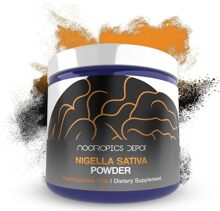
Nootropics Depot Nigella Sativa
Go to Store
Nootropics Depot Nigella Sativa
Go to StoreNigella Sativa (Black Seed) Extract General Overview
At Nootropics Depot, we love diving deep into the roots of our favorite ingredients. Black Seed Extract, sourced from Nigella sativa, is a classic staple in our lineup that has been cherished for thousands of years across regions like Southern Europe, North Africa, and Southwest Asia. The plant’s tiny black seeds are packed with wellness-supporting compounds and have even been used as a spice in Indian and Middle Eastern cuisine. What makes Black Seed truly fascinating is the delicate balance of its nutritional content. Nigella sativa seeds contain a mix of proteins, healthy fats, and carbohydrates, alongside a spectrum of vitamins such as thiamin (B1), riboflavin (B2), pyridoxine (B6), folic acid, and niacin—as well as important minerals including potassium. The essential oil fraction is the star here, making up only 0.4% to 2.5% of the seed’s weight, but housing thymoquinone, dithymoquinone (nigellone), thymohydroquinone, p-cymene, carvacrol, 4-terpineol, longifoline, t-anethole, and limonene. These bioactives are a big reason Black Seed Extract is so celebrated for holistic wellbeing. Whether you first heard about Nigella sativa in traditional herbals or you stumbled upon it in a modern supplement stack, it’s a plant with an enduring legacy.
Potential Benefits
Black Seed Extract (Nigella sativa) stands out as a versatile daily supplement that brings together centuries of use and support for many aspects of general wellness. If you’re looking for something that helps promote healthy metabolic function and keeps cellular activity running smoothly, this is a great place to start. Many people who try Black Seed Extract tell us they feel a stronger sense of day-to-day resilience—especially when life gets hectic or the seasons start to change. The plant’s natural antioxidant and antimicrobial components play a role in strengthening the body’s defenses, which makes it a solid choice for anyone interested in immune system support and vitality.
Beyond boosting immunity and metabolic health, Black Seed Extract is also valued for its gentle approach to managing stress and supporting a positive outlook. We often hear about customers experiencing steadier moods and a clearer mindset after making it part of their routine. If skin and scalp health matter to you, the vitamins, minerals, and essential oils naturally present in Nigella sativa offer subtle nutritional support from within, helping you look and feel refreshed. The cognitive benefits are another frequent highlight, with regular users pointing to sharper thinking, improved memory, and greater mental clarity as standout changes—showing up more focused for work, and being more present in everyday life.
Black Seed Extract continues to be a favorite among those who want to stay active and engaged throughout the years. Its traditional use for longevity still resonates today, and many people appreciate how this single supplement aligns with their long-term goals. So, why should you take Black Seed Extract? If you want one product that covers immune health, metabolic and cellular wellness, skin and scalp nourishment, stress support, and a boost in cognitive clarity—plus that added edge for longevity—this could be an excellent addition to your daily routine. Many customers say it helps them feel more balanced, resilient, and focused, and we think you’ll notice a difference too.
Quality and Standardization
We put quality front and center, plain and simple. Every batch of our Black Seed Extract undergoes rigorous testing and is standardized to deliver either 5% or 10% thymoquinone, so you know you’re getting exactly what you expect. Transparency is a big piece of our ethos—we offer third-party test results and clearly outline our sourcing, so there are no surprises when you buy. It’s this honesty and attention to detail that lets you confidently mix Black Seed Extract into your routine without second guessing. Whether you’re new to supplements or have an impressive stack on your counter, knowing where your capsules come from matters. And if you’re curious about our process, check out how we test—we’re always happy to show our work.
Mechanism of Action
Black Seed Extract works on several levels thanks to its complex profile of bioactive compounds. The main star here is thymoquinone, a powerful constituent found in the essential oil fraction of Nigella sativa seeds. This molecule interacts throughout the body, where it helps regulate key pathways involved in inflammation and cellular defense. Thymoquinone is joined by other important actives, like dithymoquinone (nigellone), thymohydroquinone, and a mix of aromatic compounds including p-cymene and carvacrol. Together, these help modulate antioxidant response by neutralizing free radicals, which protects cells from oxidative stress. This means the extract doesn’t just help maintain healthy cells—it also assists in reducing discomfort and supporting overall tissue recovery, which is why it shows up in pain management stacks as well.
On the immune front, Black Seed Extract plays a role in helping balance cytokine levels and supporting the activity of T cells. Nigella sativa stands out for its ability to coordinate inflammation in a way that helps your system stay on track. Its antimicrobial actions also help shield against unwanted organisms that can wear you down.
Beyond immunity and inflammation, these actives have meaningful impact on metabolic processes as well. Black Seed Extract has been shown to help maintain healthy lipid profiles and support glycemic control, giving a gentle assist to those seeking balanced metabolic function and energy levels throughout the day. The benefits translate to skin and scalp, too—antioxidants and nourishing oils promote a hydrated, resilient surface from within while calming underlying irritation. And for mental clarity, Nigella sativa’s essential oils offer neuroprotective support, helping to maintain healthy cognition and stable mood. Some users feel it helps them stay focused no matter what the day throws their way.
All these mechanisms are what drive the broad spectrum appeal of Black Seed Extract. It’s a multifaceted supplement, harmonizing immune activity, soothing discomfort, promoting metabolic stability, and nurturing brain health—all through a natural synergy of well-researched components.
Overview Of The Science
Black Seed Extract (Nigella sativa) is backed by a growing base of research highlighting its support for many aspects of general wellness. The main component, thymoquinone, along with related actives like dithymoquinone, thymohydroquinone, p-cymene, and carvacrol, helps promote healthy immune function by supporting balanced cytokine production and encouraging the activity of T cells. These compounds are also recognized for their antioxidant activity, assisting in the neutralization of free radicals and helping to maintain healthy cellular environments. Scientific studies have explored Nigella sativa’s role in supporting comfortable joint and muscle function, as well as promoting a healthy inflammatory response through its combination of antioxidants and essential oils. There is also evidence that suggests Black Seed Extract can encourage healthy metabolic function, supporting balanced lipid levels and healthy glucose metabolism. The seed’s nutritional profile—including vitamins, minerals, and essential oils—works together to foster healthy cellular activity and maintain wellbeing on multiple levels. Research continues to investigate its influence on cognitive performance, learning, and memory, with promising early findings around its ability to support healthy mood and mental clarity. Many users also appreciate how these effects contribute to a focus on maintaining overall vitality and general wellness.
Click here to read the Research Snapshot




